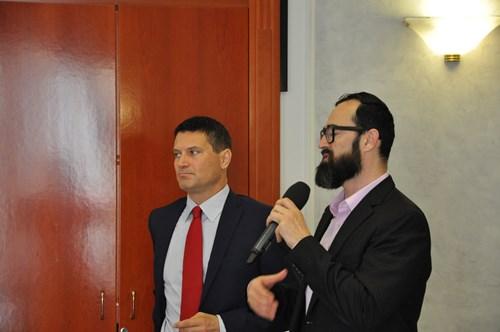Published on 29/04/2019
Tax incentives for business angels and other private investors going into an investment cycle could redefine the innovation environment for start-up companies in Slovenia.

“It is not in itself logical that private investors invest in riskier and less predictable start-up companies. To encourage them, there should be systemic incentives from the state,” said Philippe Gluntz, Honorary Chairman of the European Business Angels Association (BAE), at a meeting for private investors and other participants in the innovation and investment environment in Slovenia on 16 April 2019 as part of the ESIL programme.
Gluntz addressed over 40 participants: amongst them private investors, successful entrepreneurs, representatives of the banking sector and state ministries. Prominent speakers included a representative of the Ministry of Economic Development and Technology Alenka Marovt, a representative of Business Angels of Slovenia, Niko Slavnič, and the director of the Chamber of Commerce and Industry of the Central Slovenian Region, Marta Turk. At the round table, Matej Penca, an experienced representative of venture capital funds and the procurator of the Slovenian ‘unicorn’ BIA Separations joined the conversation, together with Luka Mohorič, the founder of Animacel, a growing bio-tech statup. The meeting was introduced by Jurij Giacomelli, as head of the ESIL program for Slovenia.
The Early Stage Investing Launchpad is the European Commission’s programme to promote private investors, which represents a two-year project of improving the innovation and investment environment in over 40 participating countries, non-EU members and non-EU countries. The main purpose and goals of the programme are to exchange knowledge and connect experienced and existing business angels with new and potential investors. As a result, ESIL creates a wide network of private investors across Europe and contributes to an increasingly dynamic ecosystem in which startup companies can successfully grow. Through its events, digital academy and online seminars, ESIL provides access to knowledge and experience, offers support infrastructure and acts as an educational agent amongst all stakeholders in the field of investment.
In his introductory address, Jurij Giacomelli presented ESIL and Slovenia’s main challenges in investing in start-up companies, where “dialogue with the state is crucial for the development of the investment ecosystem.”
Niko Slavnič generally perceives a lot of improvements and emphasises that in Slovenia it may even be “too easy to start your startup. “The main task is to promote investment and, with tax incentives, to stimulate reinvestment,” he said. He sees problems mainly in the area of lack of cooperation and communication with the state and the current state of financial policy in this field. “In Slovenia, companies face the challenge of gaining higher investment for expansion and growth, as no strong investors are present in our area.” Ljubljana is one of the friendliest startup cities, while Slovenia is ranked fourth when considering the number of ‘unicorns’ per million inhabitants, Slavnic pointed out.

“The simple and hospitable environment that exists in Slovenia enables the establishment of companies and the development of entrepreneurship,” Alenka Marovt described the desired image of the country and presented in detail the landscape of incentives and measures of the Ministry of Economic Development and Technology and other ministries for start-up companies, investors and internationalisation. “In July, in the accelerators, three-month training programmes will be launched on entering foreign markets, with the possibility of hosting startup companies in centres such as Berlin, New York or Silicon Valley.”
Marta Turk said there was not enough support for women entrepreneurs. With these issues, in recent years, they have been working with various projects that enable women to enter entrepreneurial activity. Philippe Gluntz joined in and emphasised that the only association of female business angels currently in existence is in France, and this trend is expected to spread to other countries in the future.
The main speaker, Philippe Gluntz, has been investing for more than 12 years and currently supports 30 startups with his investments. Today, in France, it still co-operates with one of the most advanced environments for new innovative companies, which it presented to the participants in more detail.
“First of all, you have to explain to the state and convince them that it is necessary, through systematic incentives, to encourage private investors to invest. There are not many good reasons private investors to invest in risky and illiquid startup companies,” explained Gluntz, and thus marked the main task for Slovenia. “Although tax deductions alone are not enough, it must be recognised that being a business angel also means mentoring, active presence and cooperation with invested companies.”
Matej Penca stressed, among other things, that grants of the state can also operate in a two-way manner: “For example, we received the support of the state, and later we suffered a lawsuit from their side due to different views on whether the conditions for its drawing up were fully met.”
“Investors who devote their own money and expertise to a particular company will be those most interested in its successful operation. Therefore, the state incentives must be destined to them, and the Slovenian government should be aware of this,” Gluntz stressed in conclusion.
For more info, contact the ESILangel for Slovenia





https://the-slovenia.com/product/the-slovenia-restaurants-top-163/


















